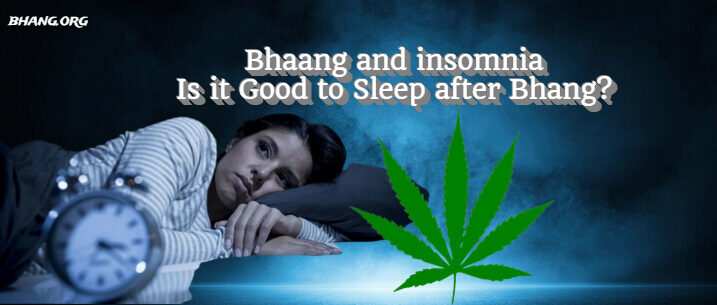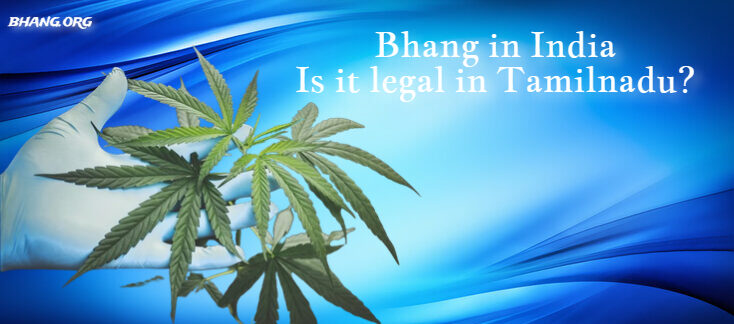
Bhaang and insomnia: Is it Good to Sleep after Bhang?
What is Bhang?
Bhang, a paste crafted from the flowers and leaves of the female cannabis plant, holds a significant place in Hindu culture. Traditionally, this paste is formed by soaking and grinding the plant material, often shaped into glossy green or brown balls known as bhang goli.
Its primary application lies in the preparation of a beverage called bhang thandai. This concoction blends bhang paste with warm milk, ground nuts, and an array of spices, commonly enjoyed during festive occasions like Holi. Bhang’s association with Shiva, the Hindu deity of destruction, adds to its cultural importance. In Hindu belief, destruction isn’t perceived negatively, as it paves the way for new beginnings.
Legends recount how Shiva bestowed bhang upon humanity, descending from the Hindu Kush mountain range. Stories depict Shiva incorporating bhang into his daily routine to augment his divine powers, earning him the epithet “Lord of Bhang.”
In India, bhang consumption is deeply ingrained and widely accepted. Even during the British colonial period, bhang remained untouched by prohibition due to fears of sparking unrest. Today, government-approved shops still sell bhang, sustaining its enduring presence in Indian society.
The Benefits and Risks of Bhang
Bhang is renowned for its psychoactive effects, primarily attributed to THC and other cannabinoids that bind to the body’s cannabinoid receptors. This interaction impacts various functions, inducing a pleasurable, often euphoric high. Unlike smoking, consuming bhang as an “edible” leads to a significant portion of THC converting into 11-hydroxy-THC during digestion and liver metabolism. This metabolite is notably more potent, resulting in a prolonged and intensified high lasting up to eight hours or more.
While bhang has historical roots in Ayurvedic practices, scientific evidence supporting its potential health benefits remains insufficient. Despite this, like other cannabis edibles, bhang poses risks of side effects. Users may experience heightened anxiety or paranoia, alongside diminished short-term memory, coordination, and judgment during intoxication.
Pregnant or breastfeeding individuals are strongly advised against bhang consumption due to increased risks of premature birth, low birth weight, and impaired brain development. Similarly, children and adolescents should steer clear of bhang to prevent potential adverse effects on brain maturation.
Is it good to sleep after bhang?
Utilizing medicinal cannabis and Ayurvedic practices to enhance sleep quality and address insomnia.
Cannabis holds a significant place among the five essential plants in the Vedas, and for good reason. Medical cannabis, also known as “Vijaya,” is believed to aid in overcoming suffering.
However, there’s been much misinformation surrounding the plant, leading to confusion among people. Yet, like any substance, cannabis can be misused, and excessive use can be harmful. However, when used medicinally and responsibly, cannabis has immense potential to alleviate various ailments and serve as a blessing for many.
We are currently witnessing a crucial shift in mindset due to ongoing research and global legal reforms, refocusing attention on the medicinal benefits of cannabis.
So, why consider medicinal cannabis?
Cannabis has been utilized in India for millennia to ease pain, relax muscles, stimulate appetite, enhance sleep, and reduce anxiety.
It’s a key component in over 80 traditional Ayurvedic formulations, in varying concentrations. For those dealing with insomnia, cannabis works by:
- Acting as an effective sleep aid, restoring the natural sleep cycle.
- Providing relief from chronic pain with its analgesic properties.
- Calming the mind and body with its anti-anxiety properties.
- Reducing stress and improving mood.
However, it’s essential to recognize that cannabis affects individuals differently, and its usage should begin gradually to assess its impact and determine the appropriate dosage. It’s advisable to consume it under the guidance of a healthcare professional and in moderation.
How does medicinal cannabis impact sleep?
The herb contains numerous cannabinoids that influence the body through the endocannabinoid system, which is part of the body’s endocrine system. This system serves as the body’s biochemical communication network, regulating various physiological functions, mood, and daily experiences. Disruption of the endocrine system can lead to disorders such as anxiety and insomnia.
Cannabinoids have the potential to regulate the endocrine system, thereby improving sleep patterns by reducing anxiety and enhancing REM sleep.
Common Causes of Insomnia
Insomnia can stem from various underlying issues, the resolution of which can gradually improve sleep.Below are a some common causes of insomnia:
Stress:
Life events such as the loss of a loved one, traumatic experiences, job changes, or starting a new job can impact both the quality and quantity of sleep. Long-term anxiety, panic attacks, and post-traumatic stress disorder (PTSD) can also lead to chronic insomnia.
Irregular Sleep Schedules:
Inconsistent sleep habits can disrupt the body’s internal clock, known as the circadian rhythm. Working in shifts and long flights causing jet lag are examples of factors that can disturb regular sleep schedules and confuse the body’s internal clock.
Poor Lifestyle and Eating Habits:
Unhealthy habits can contribute to significant sleep issues. Excessive TV watching or prolonged use of electronic devices late at night can overstimulate the brain. Additionally, habits such as consuming caffeine, alcohol, eating dinner late, and consuming spicy foods can sometimes disrupt sleep patterns, often going unnoticed. Poor sleep hygiene can also interfere with sleep.
Mental Health Disorders:
Individuals with conditions such as depression, anxiety, bipolar disorder, or obsessive-compulsive disorder (OCD) are at a higher risk of experiencing sleep problems due to the state of their mental health and mood.
Medications:
Some medications, including those for blood pressure, hypertension, asthma, thyroid disorders, and depression, may have sleep disorders as a side effect. These medications can disrupt the normal sleep cycle and lead to sleep disorders.
Medical Conditions:
Breathing issues such as heavy snoring, nasal allergies, and asthma can increase the risk of insomnia. Underlying health problems contributing to sleep disorders may include pain, complications from type 2 diabetes, menopause, frequent urination, and rapid fluctuations in blood sugar levels. Additionally, neurological conditions such as dementia, Alzheimer’s disease, and attention deficit hyperactivity disorder (ADHD) have been linked to insomnia.
Types of Insomnia
Acute Insomnia:
Also referred to as short-term or adjustment insomnia, this is the most common type and typically lasts from a few days to a few weeks. It often arises due to life events or temporary factors such as jet lag or physical discomfort. If not addressed, short-term insomnia can develop into long-term insomnia.
Chronic Insomnia:
Chronic insomnia is a persistent sleep problem that causes individuals to remain awake for at least three nights a week over a period of three months or longer. Potential causes include medical or mental health conditions, medications, and lifestyle factors.
Both acute and chronic insomnia can affect people of all ages but are more commonly experienced by women.
Onset Insomnia:
When individuals struggle to fall asleep initially and spend time tossing and turning in bed, it is known as onset insomnia. Common contributing factors include caffeine consumption and irregular work shifts.
Maintenance Insomnia:
Maintenance insomnia occurs when a person experiences difficulty staying asleep throughout the night and frequently wakes up in the middle of the night. This disrupts both the quality and quantity of sleep, leading to daytime sluggishness.
Insomnia Treatment: Sleep Disorders Treated with Medicinal Cannabis
Sleep is essential for rejuvenating the body and mind, but for those who struggle with sleep disorders, achieving restful sleep can be a challenge. Medicinal cannabis has emerged as a potential treatment for various sleep disorders, offering relief to individuals facing sleep-related difficulties. Below are the five most common sleep disorders that can benefit from cannabis-based medicines:
Sleep Apnea:
Sleep apnea is characterized by brief interruptions in breathing during sleep, lasting from 10 to 30 seconds each time. These interruptions lead to oxygen deprivation and disrupt sleep patterns.
Insomnia:
Insomnia refers to difficulty falling asleep, which can result in significant stress when prolonged over several days or nights.
REM Sleep Behavior Disorder:
Individuals with REM sleep behavior disorder may act out their dreams by talking, walking, or moving their limbs during sleep, leading to disturbances in their sleep cycles.
Hypersomnolence:
Hypersomnolence causes excessive sleepiness during the day, persisting even after a full night’s sleep, and can significantly impact daily functioning.
Restless Leg Syndrome:
Restless leg syndrome is characterized by an irresistible urge to move the legs, often accompanied by discomfort or unpleasant sensations, which can interfere with the ability to fall asleep.
Medicinal cannabis shows promise in alleviating symptoms associated with these sleep disorders, offering potential relief to individuals struggling with sleep-related issues.
Choose Authentic Products
Vedi Herbals offers a range of 100% organic Ayurvedic products designed to address various health issues, including sleep disturbances. Blow are two of our top suggestions:
Sarpagandha Ghan Vati:
Sarpagandha Ghan Vati is a natural remedy crafted by Vedi Herbals to alleviate insomnia, high blood pressure, and alcoholism, common challenges in modern life. Infused with the beneficial properties of Cannabis, this product is particularly effective in managing hypertension and promoting restful sleep.
Cannapain Capsule:
The Cannapain capsule contains a full spectrum cannabis leaf extract with balanced cannabinoids, making it an ideal solution for treating insomnia. By supplementing phyto-cannabinoids to our endocannabinoid system, it helps regulate various bodily functions, including movement, mood, memory, appetite, and pain management.
Tips:
While Ayurvedic cannabis medicines offer numerous benefits, they may have minor side effects that can be mitigated by following these dietary tips:
- Balance the heating effects of medicinal cannabis by incorporating other herbs and foods with cooling and nourishing qualities into your diet.
- Ghee, known for its nourishing properties and digestive benefits, should be included in your diet when consuming cannabis-based products.
- Spices such as cumin, coriander, fennel, rose, and saffron possess cooling digestive qualities and can complement your diet effectively.
- If smoking cannabis, consider grinding it and mixing it with powdered herbs like licorice, jatamasi, fennel, vacha (calamus), sandalwood, or jasmine to reduce its adverse effects.
- Stay hydrated with refreshing beverages like pomegranate juice, grape juice, and coconut water, which not only quench thirst but also aid digestion and promote a cooling effect on the body.
Conclusion:
In conclusion, bhang and medicinal cannabis have been used traditionally and medicinally, respectively, to address various health concerns, including sleep disturbances. While bhang holds cultural significance in Hindu rituals and festivals, medicinal cannabis offers potential benefits in treating sleep disorders when used responsibly and under medical guidance. It’s essential to understand the benefits and risks associated with these substances and make informed choices regarding their usage for improving sleep and overall well-being.
FAQs about Bhaang and insomnia
What is the significance of bhang in Hindu culture?
Bhang, made from the flowers and leaves of the cannabis plant, holds cultural significance in Hindu traditions. It is used in the preparation of beverages like bhang thandai and is associated with festivals like Holi. Legends attribute its introduction to humanity to the Hindu deity Shiva.
What are the benefits and risks of consuming bhang?
Bhang is known for its psychoactive effects due to cannabinoids like THC. While it may induce a pleasurable high, excessive consumption can lead to adverse effects such as anxiety, paranoia, and impaired judgment. Pregnant and breastfeeding individuals, as well as children and adolescents, are advised against its consumption due to potential health risks.
How does medicinal cannabis aid in improving sleep?
Medicinal cannabis, with its various cannabinoids, interacts with the body’s endocannabinoid system, which regulates sleep among other functions. It can help alleviate insomnia by acting as a sleep aid, reducing anxiety, relieving pain, and improving mood.
What are the common causes of insomnia?
Insomnia can result from various factors such as stress, irregular sleep schedules, poor lifestyle and eating habits, mental health disorders, medications, and underlying medical conditions like sleep apnea and restless leg syndrome.
Which sleep disorders can be treated with medicinal cannabis?
Medicinal cannabis shows promise in treating various sleep disorders, including sleep apnea, insomnia, REM sleep behavior disorder, hypersomnolence, and restless leg syndrome, offering potential relief to individuals struggling with sleep-related issues.


